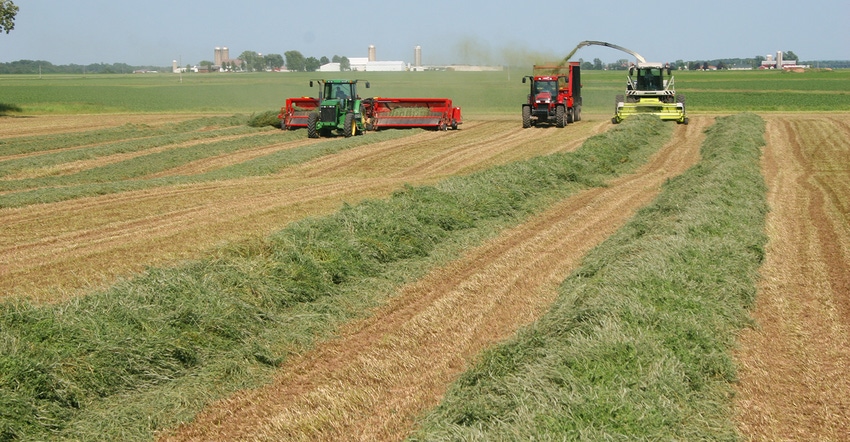June 9, 2017

A store owner typically does not let you leave the store without paying for your items. However, in farming, work is often performed first and the farmer is billed later — and many times, without even a written agreement. Everything works well until the work isn’t satisfactorily performed or the bill is not paid.
Get it in writing
Putting an agreement in writing before the work is done is one way to avoid many potential problems. The contract can clearly specify the work the provider is to do and how payment will be made. This helps avoid any problems that can result from any initial miscommunication on the work to be done. For the provider, the contract can state that interest or other late charges will apply if payment is not received on time, and it can also indicate that the farmer is responsible for costs of collection, including attorney’s fees. In this typical scenario, however, the provider has no collateral or security to ensure he or she will get paid.
To ensure payment, a provider can do a number of things. One is to require a down payment prior to beginning the work. Another is to require a letter-of-credit from the farmer’s bank. A letter-of-credit guarantees payment to the provider, usually once certain conditions are met.
Still another option is to have the farmer grant to the provider a mortgage or security interest in property of the farmer. A mortgage secures an interest in real estate for the provider, while a security interest secures an interest in personal property.
In other specific situations, the provider may have a lien that arises according to law. Some common types of liens are construction, mechanic’s, thresherman’s, breeder’s and a boarding lien. The boarding lien can be especially powerful. It allows a heifer raiser, for example, to retain possession of a farmer’s heifers until the raiser is paid for raising them.
When left with no other alternative to collect money, filing a lawsuit must be considered. Lawsuits can be timely, expensive and unpredictable. Often, if someone is suing a person for services provided, the person will countersue for the services not being done correctly or in a good workmanlike manner. The other issue in a lawsuit is that it is usually not advisable to sue someone who doesn’t have any money. More correctly, it is often not advisable to sue someone if he or she is just going to file for bankruptcy.
Filing bankruptcy
Bankruptcy is part of the U.S. Constitution and is designed to give the debtor a “fresh start.” There are two main types of bankruptcies.
The first is a liquidation, which is found under Chapter 7 of the Bankruptcy Code, so it is usually referred to as a “Chapter 7 bankruptcy.” In a Chapter 7, the debtor is allowed to keep some of his assets, depending on the type and value of such assets. This means the debtor often keeps personal property, a vehicle, some cash and a specified amount of equity in the debtor’s primary residence. In addition, the debtor is generally able to keep IRAs, 401(k)s and other retirement accounts. The debtor’s remaining assets are then sold, with the proceeds used to pay administrative expenses first, then secured creditors, then priority creditors and then unsecured creditors.
Usually and unless the service provider took some other steps, the service provider falls into the unsecured creditor category. Often, the unsecured creditors are not paid in full, but rather receive a pro-rata amount based on the amount of the claim as compared to the other unsecured claims. It is not uncommon for unsecured creditors to receive nothing in a Chapter 7. Any amounts owed to an unsecured creditor that are not paid as part of the Chapter 7 are discharged, meaning the debtor no longer legally owes the debt.
The other type of bankruptcy is known as a reorganization. Essentially, the debtor sets up a payment plan with his or her creditors. There are three types of reorganizations: one is under Chapter 11 of the Bankruptcy Code, which is for businesses; the second is under Chapter 12, which is for farmers and fishermen; and the third is under Chapter 13, which is for individuals. Typically, administrative expenses, secured creditors and priority claims are paid in full. An unsecured creditor, however, is generally only entitled to receive as much as the unsecured creditor would have received had the debtor filed a Chapter 7 bankruptcy. Otherwise, the unsecured creditor’s debt is again discharged.
The sooner you seek legal advice from an attorney about collecting a debt from someone, the more likely you will be able to collect that debt. Being proactive, including speaking to an attorney before doing the work, often leads to the best result.
Wisconsin Farm Technology Days
Be sure to stop and see us in the agribusiness tent at Booth A075 at Wisconsin Farm Technology Days, July 11-13. At least one of our ag attorneys will be there to answer any questions you may have.
Halbach is a partner in the ag law firm of Twohig, Rietbrock, Schneider and Halbach S.C. Call Halbach at 920-849-4999.
About the Author(s)
You May Also Like






